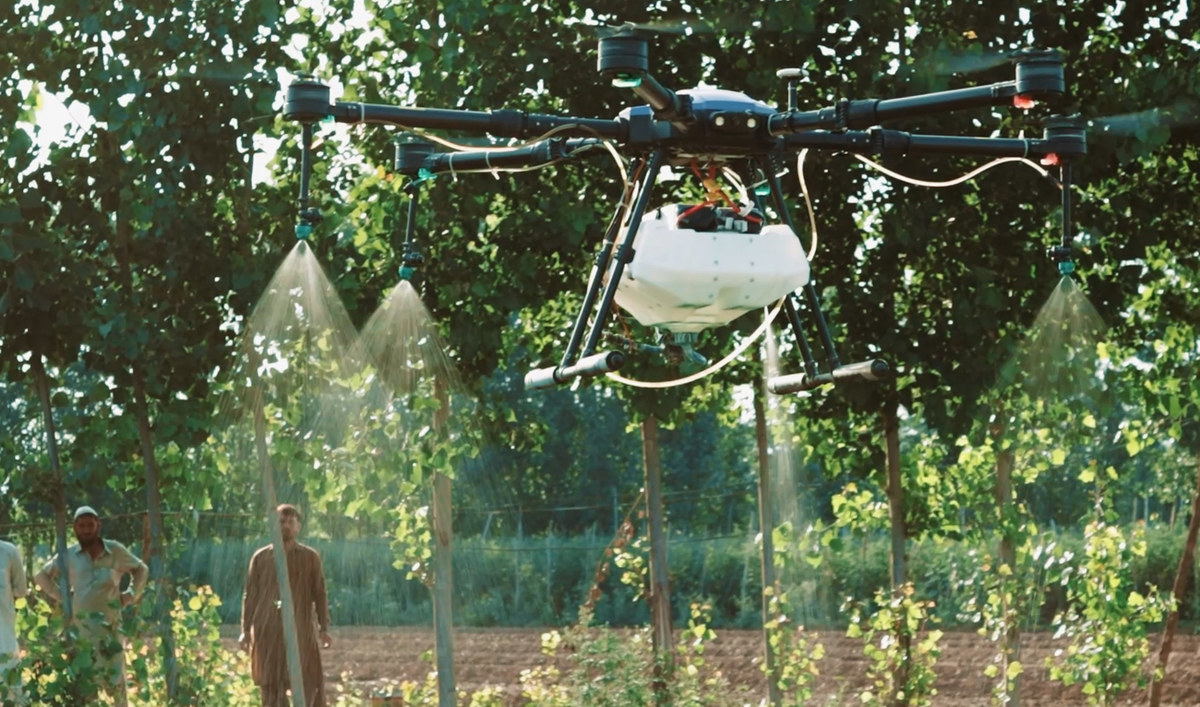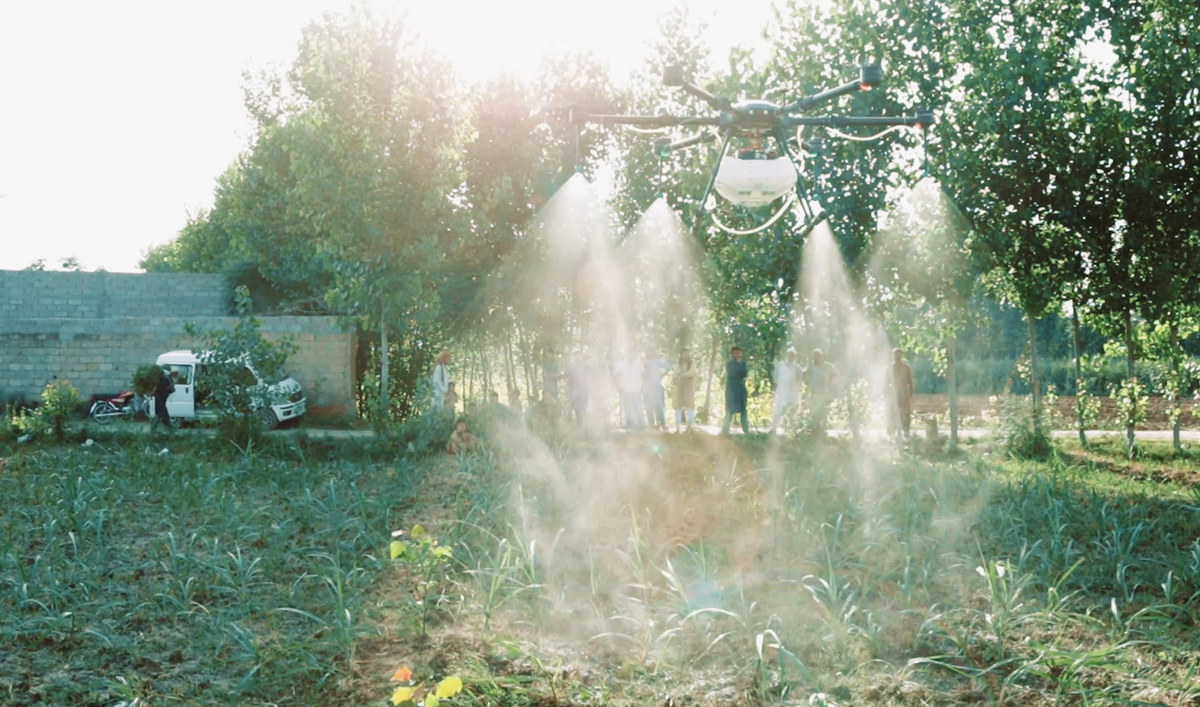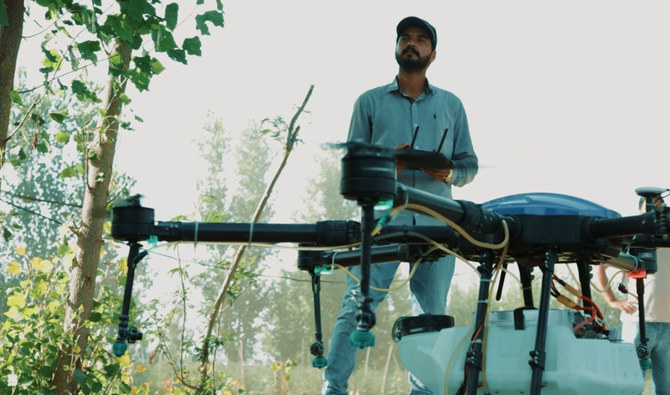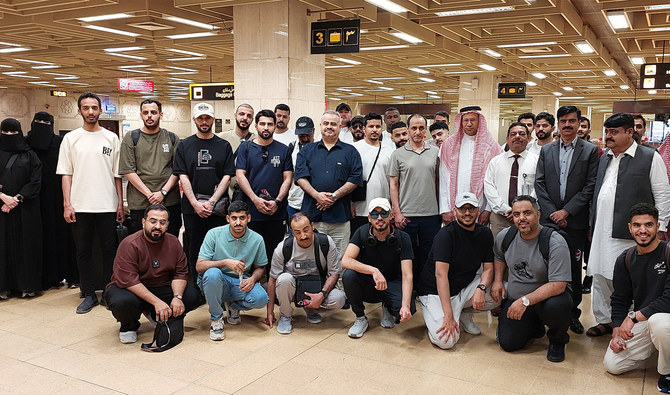ISLAMABAD: The next generation farmhand in Pakistan may be a drone.
Since 2020, a woman-led Pakistani company called Kalam4Solutions has been teaching Pakistani farmers how to use drones that can hover above fields and perform backbreaking tasks like spraying pesticides and applying fertilizers in a fraction of the time it takes to do it by hand.
The goal of Kalam4Solutions, set up in 2018, is to provide high-tech relief for rural communities and help farmers save time, energy, and money in a country where agriculture is the largest sector of the economy, contributing around 24 percent to Gross Domestic Product (GDP), accounting for half of the employed labor force, and being the largest source of foreign exchange earnings through exports.
Kalam4Solutions has sprayed 3,000 hectares since it turned to drone technology in 2020. The company’s teams — each comprising two technicians and two drone operators — are currently deployed at farms in the northwestern towns of Swabi and Mardan in Khyber Pakhtunkhwa province and in Rahim Yar Khan city in Punjab. A drone costs the company around $13,000 (Rs2.5 million) each and it charges Rs2,000 per hectare from farmers.
A drone can apply pesticides and fertilizer to a 40-acre-field in a day while a human can cover barely one acre in the same time period, and that too while lugging around heavy tanks.
“The vision is to make this technology accessible and available in every village of Pakistan so that the farmers get benefits through this technology,” Syeda Rozena Saleha, the chief executive officer and co-founder of the company, said in an interview with Arab News this week.

Syeda Rozena Saleha, the chief executive officer and co-founder of Kalam4Solutions speaks with a team member in Mardan district in Khyber Pakhtunkhwa province of Pakistan in June 7, 2023. (AN Photo)
“This is cost-efficient ... Its efficacy is more than a person. It has forty times more coverage.”
Using drones to spray powerful fertilizers and pesticides is also safer for humans.
“Those who spray pesticides manually can contract lung and liver diseases, whereas spraying them from drones is safe for the farmers,” Saleha said.
Syed Hasnain Shah, an engineer at Kalam4Solutions, added:
“The biggest advantage [of using drones] is to human life as there is a danger to human life when [pesticides] are sprayed manually. The second advantage is that a drone does the job of ten people in a day, which manually takes a lot of time.”

The photo shows a Kalam4Solutions drone being propelled into air by a worker in a farmland in Mardan district in Khyber Pakhtunkhwa province of Pakistan in June 7, 2023. (AN Photo)
According to a recent research study published in the journal “Acquaculture” titled, “Efficiency of Using Drones in Agricultural Production,” the use of unmanned aerial vehicles helps increase crop yield by 20 percent and reduces costs by up to 15 percent.
Across Asia, the trend toward data-based precision agriculture and other digital tools is being driven by demographic changes, technological advances here and climate change, according to the Food and Agriculture Organization of the UN (FAO).
“They help farmers produce more with less water, land, inputs, energy and labor, while protecting biodiversity and reducing carbon emissions,” the FAO said in a report last year on digitalization in agriculture.
“Farmers can optimize yields and obtain major cost savings, enhanced efficiency, and more profitability,” it said.
Pakistani farmers agree.
“The drone has reduced our [pesticides spraying] cost comparatively, and we get better crop yield,” said Mohammad Khalid, a sugarcane farmer in Mardan. “We are happy to utilize this technology for our benefit and hope it continues to make our lives easier by improving crop yields and profits.”
But agricultural technology — or agri-tech — also poses risks from job losses to social inequities and data governance concerns and the technologies can be costly and hard to adopt, particularly for women and older farmers.
But Saleha believes the changes are for the better.

The photo shows a Kalam4Solutions drone being propelled into air by a worker in a farmland in Mardan district in Khyber Pakhtunkhwa province of Pakistan in June 7, 2023. (AN Photo)
“Change is difficult at first, but once people are made aware, they adopt it very fast,” she said. “When people adopt technology, it doesn’t mitigate the jobs, it actually creates new jobs for farmers.”
Saleha said drones could also be used for analytics and crop health management, allowing farmers to identify damage through aerial view and apply remedial measures to boost crop yields.
“We can integrate multiple payloads with it, not only fertilizers and spraying, but also very sensitive sensors that can help farmers identify any damage to their farmland,” the CEO said.
“If the damage is identified at an early stage of crop growth, the farmer can take countermeasures against it … The production and overall yield of the farmland can also be enhanced four or five times.”
Saleha’s future plans include working on material innovation by building structural parts of the drones in-house instead of importing them at exorbitant rates, and looking for funding for her company.
“Multiple groups have reached out to us from the Middle East,” she said. “They showed their interest in investment in this company.”
















